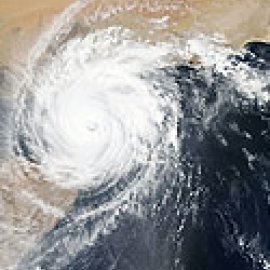Insurance in a New Climate Era
-
English
-
ListenPause
[intro music]
I’m Peter Neill, Director of the World Ocean Observatory.
World Ocean Forum is the World Ocean Observatory’s online solutions platform where we publish innovative ideas for necessary change in our ocean world. Recently, we published an article by McKinsey & Company, international consultants, that explored new strategies and products for the insurance industry in the changing climate era.
We are already seeing the key role played by insurance as we face the destructive consequence of extreme weather: storm, flood, fire, heat, drought, erosion, inundation, and radical destruction of physical property and social dislocation. Government agencies, like the Federal Emergency Management Agency (FEMA), a division of the US Department of Homeland Security, are already signaling policy and coverage shifts as a result of limited budget, increasing number and amounts of claims, and the realization that existing policies and programs are not adequate to the new realities. Private insurance companies are limiting coverage amounts, and often, in the most vulnerable areas, cancelling all coverage. This is compounded by the unusual, not well understood by most of us, existence of reinsurance, where one company transfers some percentage of its exposure to another as a mitigation of risk and liability when disaster strikes.
Risk assessment is a discipline, informed by real world observation, statistics, projections and predictions. Given the number and amplification of loss revealed in extreme weather events this year, worldwide, you wonder if the assessments would argue for writing no insurance at all.
The McKinsey report opened the discussion of a new insurance approach, adaptable to changing circumstance, that is more than reactive, but rather suggests an involvement by companies as catalysts and investors in new technologies and alternative opportunities based on future predictions not historical actualities. The report proposes a diversion of premium revenue from conventional investment to climate investment in three areas: the net zero transition, new transfer/offsets for increasing physical risks, and provision of adaptation and resilience services – offering a new blend of traditional property and casualty coverage as well as innovative products to meet emerging market demand.
The investment landscape is enormous as we move away from traditional fossil fuel technology to renewable, alternative energy as a major counter-force and effective climate response. This new enterprise will need traditional coverage – for construction, surety, and liability – but there will be other opportunities for coverage of new adaptation and invention that will need protection against failure, income loss, unexpected events, and, yes, even the continuing expansion of climate-related physical risk in any place at any time.
Additionally, insurance companies can contribute through increased targeted investment, providing data, funds, and expertise to novel technology. Insurance companies can make and insure new capital investments through partnerships, guarantees, access to new investors and new markets, the efficiency of syndicated funds, and, even the refocus of reinsurance – all tactics designed to reduce payouts and costs that are often a debilitating burden on start-ups or capital-intensive new ideas, while enabling alternatives and solutions.
This reallocation, matched to the cessation of oil and gas emissions and their contribution to the ongoing climate change process, may be the ultimate risk reduction adaptation to be made here, and in that transition lies fresh profit generated as financial return, not loss; social reorientation, health and safety, not destroyed communities and social unrest; and transition away from a failing financial model to a new insurance-supported economy that is proactive, not reactive, to changing conditions; in effect, a renewable resource in and of itself.
We are faced today with inexorable change, as a negative force and socio-political condition. We must now be aware of the damage any lack of response is incurring on our lives today, but more importantly, our children’s lives tomorrow. The insurance industry is a fundamental, powerful, and mostly invisible element of our livelihood, Knowingly and unknowingly, we live within its embrace, we cleave to it, to ease the pain of loss -- of our health, our property, our community security, and our future. We may not be fully aware of its foundational presence in our lives, until we face disaster and it is not there. It, too, must face the compelling consequence of climate change. We cannot dismiss or ignore it, as it might well be the force that drives the necessary change that our government and our own disabling fears have failed to embrace.
WORLD OCEAN RADIO IS DISTRIBUTED BY THE PUBLIC RADIO EXCHANGE AND THE PACIFICA NETWORK, FOR USE BY COLLEGE AND COMMUNITY RADIO STATIONS WORLDWIDE. FIND US WHEREVER YOU LISTEN TO PODCASTS, AND AT WORLD OCEAN OBSERVATORY DOT ORG, WHERE THE FULL CATALOG OF NEARLY 700 RADIO EPISODES IS SEARCHABLE BY THEME.
[outro music]
We are aware of the key role played by insurance, more so as we face increasing events of extreme weather destruction. Government agencies are signaling policy and coverage shifts, and there is a growing realization that existing policies and programs are not adequate to the new realities. Insurance is fundamental yet largely invisible until it is not there, and may be the driving force toward necessary change for the future.
About World Ocean Radio
Peter Neill, Director of the World Ocean Observatory and host of World Ocean Radio, provides coverage of a broad spectrum of ocean issues from science and education to advocacy and exemplary projects. World Ocean Radio, a project of the World Ocean Observatory, is a weekly series of five-minute audio essays available for syndicated use at no cost by college and community radio stations worldwide.
- Login to post comments



